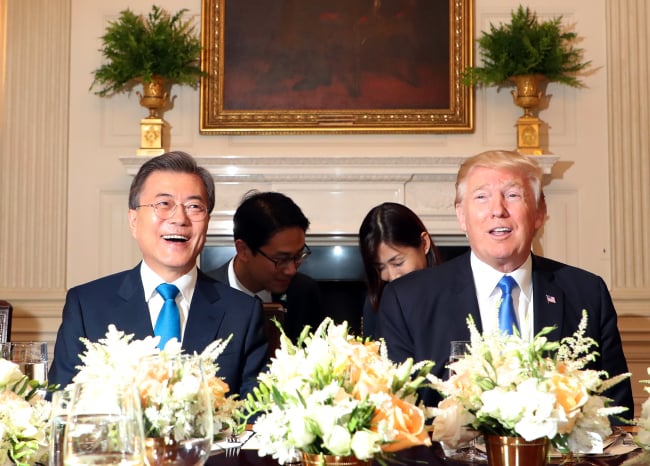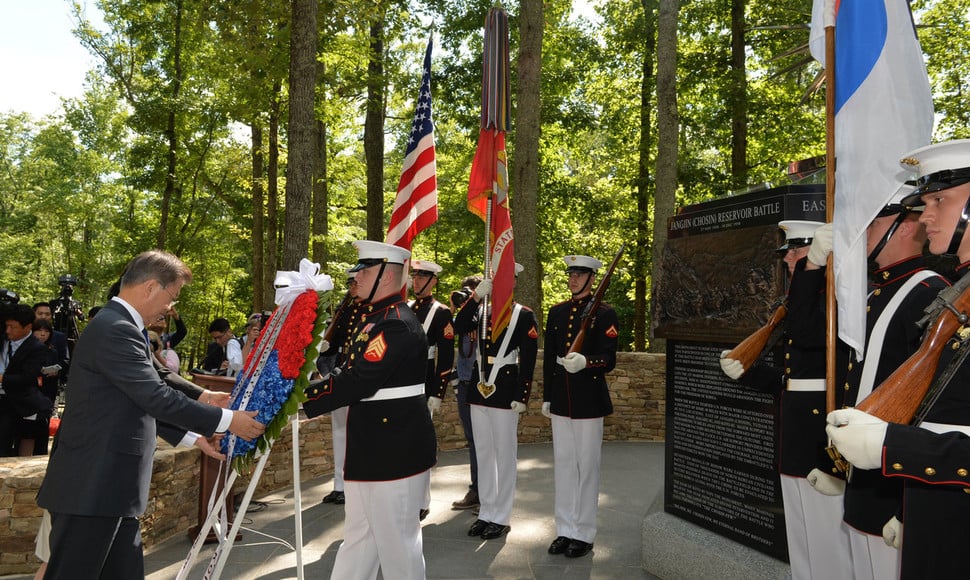
U.S. President Donald Trump meets with South Korean President Moon Jae-in (left) at the White House in Washington, DC on June 29. (Yonhap)
U.S. President, Donald Trump and South Korean President, Moon Jae-in, wearing similar-tone-bearing blue ties reaffirmed their ‘ironclad’ commitments to the U.S.–ROK ‘blood alliance’. During a joint press conference, held in the White House Rose Garden on June 30, the leaders affirmed their bond regarding a unified assertion against North Korea’s existential treats. They agreed on the fact that North Korea’s ballistic and nuclear weapons development has reached a tipping point, where ‘maximum pressure’ needs to replace ‘strategic patience’ in a bid to curb North Korea’s evolving errant behavior.
Nonetheless, the two leaders showed a hint of flexibility regarding the extent of strategic choices under consideration, by underlining that their utmost priority is to keep the Korean peninsula peaceful. In this sense, the White House respected Moon’s pursuance of a ‘two-track’ strategy, by acknowledging the importance of initiating a dialogue with North Korea ‘under the right circumstances’. Although the nature of such circumstances remains open to subjective interpretation, the U.S.–ROK alliance has adamantly emphasized that the measures of UN sanctions should be heightened, unless North Korea fulfills its basic obligations to denuclearize itself as a responsible member of international society. In the meantime, the alliance has occasionally softened its tone by making it clear that it does not seek regime change or regime collapse in North Korea. The summit, held for the first time following Moon’s restoration of presidential powers in South Korea, shared the common goal of denuclearizing the Korean peninsula in a peaceful manner, and re-appreciating South Korea’s leadership role in moving the process toward peaceful unification of the Korean peninsula.

President Moon Jae-in lays a wreath at the memorial to the Battle of Chosin Reservoir at the National Museum of the Marine Corps, in Virginia, June 28. (Blue House photo pool)
Moon began his four-day trip to the White House by attending the dedication ceremony for the Chosin Few Battle Monument on June 28. Surprisingly, Moon’s own parents were among the refugees saved by U.S. Marines from Chinese attack during the Battle of Chosin Reservoir. At the dedication ceremony, Moon sincerely demonstrated his gratitude in his speech toward the U.S. veterans gathered at the event. He confessed his personal indebtedness to them as follows: “If it hadn’t been for those who fought in the Battle of Chosin Reservoir, if the operation to evacuate the port of Hungnam hadn’t been successful, my life would probably have never begun, and I would not be here today”. He also added how the veterans’ sacrifices had not been forgotten by the nation, either: “The Republic of Korea remembers your and your parents’ sacrifice and dedication. Its memory of gratitude and respect will continue forever”.
Such efforts on Moon’s part to revalorize the U.S.–ROK blood alliance were revealed as even more resolute in his trade gift. Leading South Korean conglomerates that accompanied Moon as part of his business delegation announced constructive job-creating investment plans on American soil. Samsung Electronics will invest $1.8 billion in home appliances and semiconductor plant facilities in South Carolina and Texas. Likewise, LG Electronics will spend $550 million on washing machine plants in Tennessee and New Jersey. SK Group and GS Group will begin importing American shale-gas in a few years, while Hanjin Group will purchase 50 additional planes from Boeing over the next seven years. These investments plans were, however, unfortunately not enough to appease Trump’s appetite for the ‘America First’ doctrine. Trump addressed the trade imbalance issue between the two countries in his statement, prognosticating renegotiation of the U.S.–Korea Free Trade Agreement, or KORUS FTA.
In the greater scheme, however, this trade imbalance is not a major point for the U.S–ROK alliance. There are still many issues that the two countries need to seek agreement on, based on close mutual trust. In this regard, the summit successfully regularized a 2 + 2 ministerial meeting, as well as a high level Extended Deterrence Strategy and Consultation Group under the common purpose of strengthening extended deterrence against the Kim Jung-un’s threats.
Bad Omen for the Future of Two-Track Policy?
The U.S.–ROK summit approved Moon’s two-track policy, offering the Kim Jung-un an opportunity to exit from its current escalation phase. However, Kim Jung-un dynasty refused to do so, at least initially, speaking instead of its intention to directly play the game with U.S . On the eve of Independence Day, the Kim dynasty tested Hwaseong 14 ICBM, the country’s leader calling the event a “package of gifts” for Americans. The Kim dynasty’s such test since the Moon administration took power overshadowed Moon’s July 6 ‘Berlin Declaration’, which was intended to solemnly manifest the revival of the Kim Dae-jung administration’s inter-Korean rapprochement approach.
In a coordinated response, the U.S., South Korea and Japan swiftly released a joint statement in the middle of the annual G-20 meeting hosted by Germany, calling again for newer and tougher UN sanctions against Kim Jung-un’s provocation, as well as China’s greater role in restraining Kim Jung-un. U.S. ambassador to the UN, Nikki Hailey, at a UN Security Council meeting called Kim’s unexpected gift “a clear and sharp military escalation” and further stated that “we will work with China…but we will not repeat the inadequate approaches [of] the past”. South Korean Foreign Affairs Minister, Kang Kyung Hwa, seemed to concur with these remarks when she told the National Assembly on July 9 that she is in the process of discussing secondary boycotts with the U.S.
As Kim Jung-un’s provocations evolve into a new phase, some analysts suggest that a nuclear freeze in exchange for the suspension of annual U.S.–ROK military exercises is the only viable solution to the problem. Nevertheless, latest developments testify that the time is not yet right. Perhaps Kim Jung-un’s greed to maximize his negotiation leverage has grown too immense for the carrot-oriented Moon-shine policy to properly work.